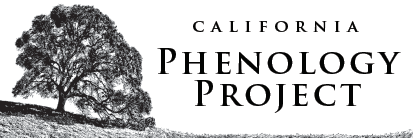Guides
Phenology Gardens Guide
A 36-page practical guide for integrating phenology into garden planning and education. (4.1MB)
A Primer on Herbarium-Based Phenological Research
This 19-page guide provides an overview on herbaria, how they’re used to study phenology and climate change, and prepares readers to initiate their own herbarium-based phenological research. (1.5MB)
Activities, lesson plans, and guided analytical exercises
Skeletons in the Closet -- An Herbarium-Based Phenology Data Activity
Download the data set here (19KB)
Using a data set derived from herbarium specimens collected in California from 1906-2009, you’ll be guided step-by-step through the processes of organizing, summarizing, visualizing, and analyzing the data using Microsoft Excel.
Flight of the Pollinators
Experience the importance of plant phenology from a pollinator’s perspective! *Recorded data can be contributed to the national scientific effort to detect the effects of climate change on plants and animals (USA National Phenology Network). (1.5MB)
Ethnophenology
Experience plant phenology from the perspective of traditional medicine! *Recorded data can be contributed to the national scientific effort to detect the effects of climate change on plants and animals (USA National Phenology Network). (1MB)
Phenology Relay Race
This fun activity gets students working together and running while reinforcing their knowledge of plant phenology and monitoring protocols for the USA National Phenology Network. (735KB)
Phenology Scavenger Hunt Activity
Participants search phenology gardens or outdoor habitats for seasonally-available plant structures (plant phenophases monitored by the USA National Phenology Network). Once found, participants photograph, illustrate, describe, or collect and curate the plant phenophases.
Secret Observations Game
In a fun and somewhat suspenseful setting, students provide descriptions of hidden objects to their peers, who then work to identify the object based only on that description.
Standards-aligned lesson plans (aimed at 5th grade, adaptable for others)
Lesson Plan I | Lesson Plan II
These two lesson plans are designed to teach students everything they’ll need to know to observe plant phenology and record data for the USA National Phenology Network. Written for phenology gardens, these activities can be conducted in any outdoor setting.
Lectures
Lecture I -- Introduction to Phenology, the Science of the Seasons
LECTURE SLIDES (pdf - 4.5MB) | LECTURE NOTES (pdf)
Includes a climate change crash course that serves as a platform to explore how phenology is studied and the many scales at which it’s studied. Concludes by addressing how phenological research contributes to our understanding of climate change.
Lecture II -- Coordinated Phenology Research Networks: Nuts, Bolts, and Roles
LECTURE SLIDES (pdf - 4.2MB) | LECTURE NOTES (pdf)
A broad introduction to ongoing coordinated phenological research in the U.S., including the USA National Phenology Network and regional efforts connected with it like the California Phenology Project.
Lecture III -- Phenological Responses to Environmental Changes: examples and potential outcomes
LECTURE SLIDES (pdf - 3MB) | LECTURE NOTES (pdf)
Uses a series of peer-reviewed case studies to characterize and interpret some of the phenological changes observed in plants and animals. Highlights current (and recurring) topics addressed by the phenological research community.
Seminar Modules
Overview of all seminar modules (115KB)
A brief introduction & complete list of module topics & references
Seminar Module 1 -- Synthetic Studies Of Phenology: Reviews And Meta‐Analyses (1.4MB)
An excellent entry point into the field of phenological research and its many contributions to climate change research.
Seminar Module 2 -- Back to the Future: Use of Historical Records in Phenological Research (725KB)
From Thoreau’s journals to modern data sheets, this module explores how journal entries, preserved plants, and photographs have been used to detect phenological changes over the past 150 years.
Seminar Module 3 -- Plant‐Climate Interactions (2.3MB)
This module explores the adaptive significance of plant phenological responses to climatic conditions, over the short-term (one growing season) and over the long-term (two decades).
Seminar Module 4 -- Animal‐Climate Interactions (1.2MB)
This module explores current research on mammalian and avian phenological responses to climatic conditions, and how population demographic patterns are shaped by those responses.
Seminar Module 5 -- Phenological Mismatches in Marine and Terrestrial Systems (1MB)
A large and growing body of research indicates that different species’ phenological schedules respond differently to climate change. This module incorporates examples from marine and terrestrial ecosystems to explore the cascading effects of phenological shifts within ecological communities.
Seminar Module 6 -- Phenological Responses To Climate Change I: Adaptation and Evidence of Natural Selection on Phenological Traits (912KB)
This module explores whether new phenological strategies can evolve fast enough for plant and animal populations to keep pace with rapidly changing environments.
Seminar Module 7 -- Phenological Responses To Climate Change II: Demographic and Geographic Range Shifts (935KB)
This module explores how, for better or worse, phenological changes have allowed some plants and animals to disperse into new geographic regions.
Seminar Module 8 -- Phenological Responses to Climate Change III: Reproductive Changes (3.7MB)
Using a case study from the avian literature as a starting point, this module explores how phenological changes might affect the availability of mates during reproductive seasons and, therefore, the process of phenologically-mediated sexual selection. *This module is designed for seminar participants to conduct their own searches of the scientific literature in order to contribute to the discussion.
Seminar Module 9 -- Socio‐phenology: How Are Phenological Shifts Influencing Human Populations? (678KB)
Using articles on agriculture and allergens as a starting point, this module explores how climate change is influencing phenological processes that directly (and indirectly) affect the health and well-being of human populations. *This module is designed for seminar participants to conduct their own searches of the scientific literature in order to contribute to the discussion.





